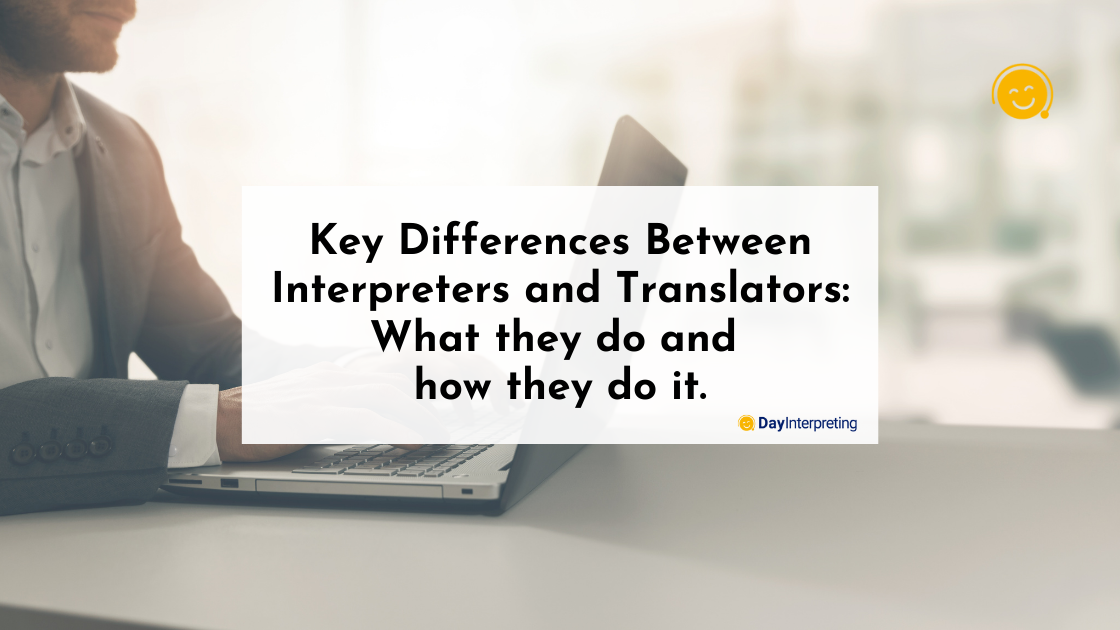You may have asked the question ‘What sets interpreters and translators apart? How are their jobs different?’ Some individuals are in search of interpreters and what they really need are translators, so you should be able to spot the differences. So, what exactly are the key differences between interpreters and translators?
Allow us to help you differentiate between the two, just in case you were curious or want to draw on this knowledge in the future.
Inspecting the Key Differences Between Interpreters and Translators
What is Interpretation?
Interpretation is a service that is delivered in real-time. This is done either simultaneously or shortly after the original speech. Simultaneous interpreting (and consecutive) is done with no assistance from scripts, dictionaries, or other reference resources.
Professional interpreters must transpose the source language within context. They must retain the original meaning while rephrasing idioms, colloquialisms, and other culturally distinctive allusions in ways that the target audience may understand. The only resources available to an interpreter are expertise, a reliable memory, and fast reactions.
Interpreters work on live translation projects such as conferences and meetings, medical appointments, judicial procedures, live TV coverage, and sign language. They often specialize in either consecutive or simultaneous interpreting services.
What is Translation?
Language translation is transforming the written word from one language into another in a culturally and linguistically acceptable manner so that it may be understood by the target audience.
Translators work on any written information including; Print, websites, video subtitles, software, and multimedia. They often work with translation memory tools that can assist them with translating the written word. Translators work off-site and are not present in live conversations like interpreters.
The Differences Between Interpreters and Translators
Translators have a wide range of resources at their disposal. If needed, websites, dictionaries, and a variety of reference resources are at hand.
Time it Takes to Complete the Job
Furthermore, many businesses today are increasingly relying on machine translation technologies to reduce turnaround time for clients.
Machine translation, though not as reliable and accurate as human translation, may still be a useful tool for comparing and contrasting complex content when translators are pressed for time.
Interpreters, on the other hand, do not have the luxury of time. They must be quick on their feet, have excellent reaction times and be able to absorb what one person says in a second and give it to an audience without delay.
Medium of Work
One important aspect of interpretation is that it is done orally. Interpreters are experts in the spoken word. An interpreter is called in to guarantee that the audience for one language understands what is being said in another, whether it is live and in person or on pre-recorded video or audio. Precision is essential, and interpreters strive for verbatim, although this is not always attainable in certain situations.
On the other hand, translators delve even deeper. To do their jobs effectively, they must also get intimately acquainted with a language and its accompanying dialects, as well as the locations where it is spoken. Translators must not only grasp the source language but also write well in the target language.
Interpreters immediately interpret words and idioms between two languages, which offers plenty of possibilities for error. Translators, however, have more time to evaluate a text and seek the best meaning transference. As a result, translations are far more precise than interpretations.
Delivery of Translations in Target Language from Source Language
Because of the nature of their role, interpreters must be proficient in both the source and target languages to translate in both directions. They must also be able to do it promptly and without needing reference materials. This type of labor is so taxing that interpreters frequently need to take breaks between sessions to avoid mental exhaustion.
Professional translators often only operate in one direction; translating into their original language. This means that translators don’t need to have the immediate fluency of language that an interpreter does. A translator’s major abilities are understanding the source language and applying their knowledge of the target country’s linguistic and cultural practices.
Personality Differences Between Interpreters and Translators
The role of translators and interpreters extends further than the transmission of information to cover matters of style and expressive subtleties. Interpreters must capture the tone, pronunciation, voice quality, and other aspects of the spoken word. Whereas translators strive to preserve literary aspects such as allusions, rhythm, metaphors, and recurring themes.
Conclusion
We hope that we provided clarity on the differences between translators and interpreters and the roles both play. Both roles are equally important and require an expert skillset. Without scrolling, why don’t you try to think of three differences between translators and interpreters and leave a comment below?
Here at Day Interpreting, we understand the importance of professional, efficient interpreters. We strive to assist you in avoiding the hazards associated with not utilizing a professional and trained language interpreter. As a result, we make it simple for you to communicate with a trained interpreter immediately.
Our language interpretation specialists make it simple for global enterprises to connect in several languages. We not only supply phone interpreting professionals, but also subject matter experts for your unique circumstances. Don’t delay, connect with us today!





0 Comments